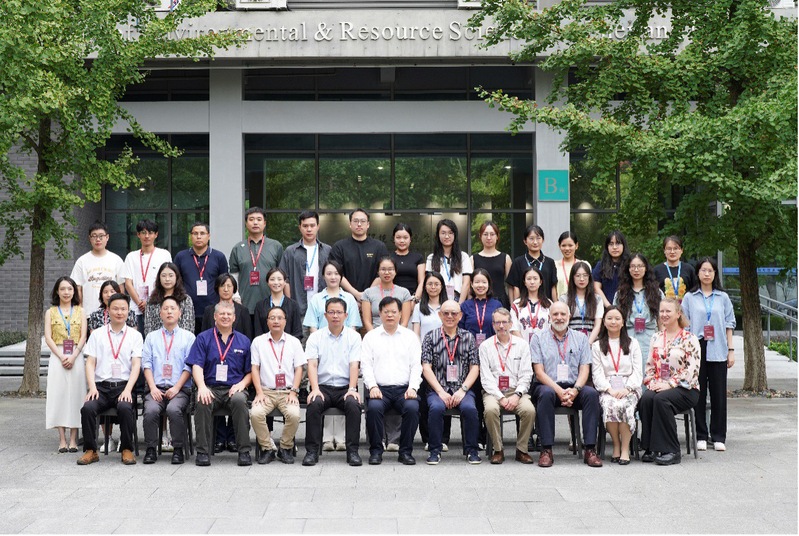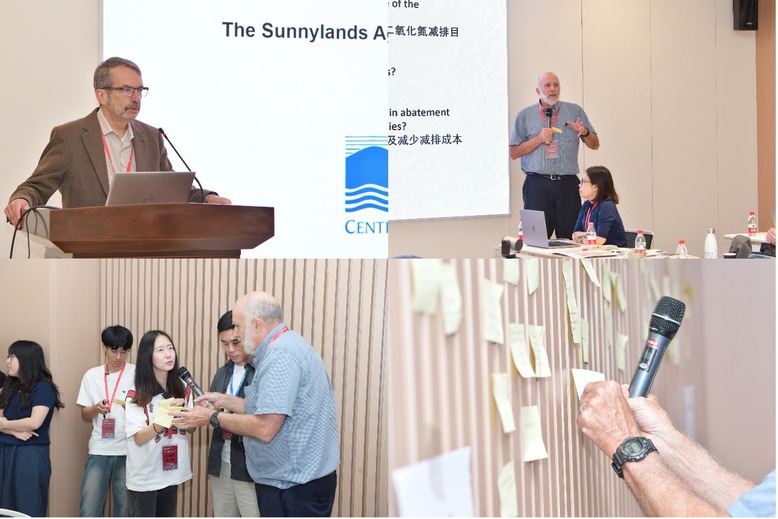Co-creating the Future, Enhancing Collaboration: The Joint Meeting of an NSF-NSFC Project Successfully Held in Hangzhou
2024-10-29
On September 18, 2024, the joint meeting of a research project, co-funded by the National Science Foundation (NSF) of the United States and the National Natural Science Foundation of China (NSFC), was held in conference room B110, College of Environmental and Resource Sciences at Zhejiang University (ZJU). The American task force was led by Professor Xin Zhang at the University of Maryland Center for Environmental Science, while the Chinese task force was led by Professor Xiaoyuan Yan at the Institute of Soil Science, Chinese Academy of Sciences (CAS), along with Professor Baojing Gu from the College of Environmental and Resource Sciences at ZJU. This meeting showcased achievements in collaboration between the research funding organizations of China and the United States, particularly in addressing global sustainability challenges within the Food-Energy-Water (FEW) system.

Professor Heping Zhao, Vice Dean of the College of Environmental and Resource Sciences at ZJU, delivered the opening speech, highlighting the significance of Sino-American cooperation in the field of agricultural nitrogen management. He emphasized that food, energy, and water are crucial for achieving the sustainable development goals proposed by the United Nations. By optimizing nitrogen management in agriculture, China and the United States could together contribute to the sustainable development of the Food-Energy-Water (FEW) system. He urged participants to seize this opportunity to deepen cooperation, exchange knowledge, and enhance cooperation between two countries in nitrogen management. The meeting was co-chaired by Professor Xin Zhang from the University of Maryland Center for Environmental Science, and Professor Baojing Gu from the College of Environmental and Resource Sciences in ZJU. Professor Baojing Gu and PhD candidate Yanyu Wang presented an overview and preliminary results of the joint project on behalf of the China and United States task forces, respectively.

The meeting also discussed the potential bilateral collaborations aimed at reducing emissions of nitrous oxide (N2O), a potent greenhouse gas, as outlined in the Sunnylands Statement. Professor Eric Davidson and Professor Bill Dennison, both from University of Maryland Center for Environmental Science, introduced relevant policies and facilitated group discussions.

In the afternoon, the meeting invited representatives from government and industry in China and conducted a Joint-Stakeholder workshop for China and United States. The workshop provided in-depth insights into major sustainable development goals and implementation strategies focused on nitrogen management. Participants engaged in extensive discussions on enhancing cooperation in agricultural nitrogen management and addressed the challenges and opportunities for China and the United States within the FEW system.
Notable attendees included Professor Xiaoyuan Yan, Deputy Director of the Institute of Soil Science in Chinese Academy of Science (CAS); Professor Robert Meinen from Pennsylvania State University; Alison Eagle and Sun Fang, experts from the Environmental Protection Fund; and Professor Liang Dong, from University of Maryland Center for Environmental Science at the University of Maryland.
Additional contributors to the discussions included Yongguan Zhu, an academician from the Research Center for Eco-Environmental Sciences in CAS; Professor Deli Chen and Dr. Emma Liang from the University of Melbourne; and Dr. Chaopu Ti from the Institute of Soil Science, CAS. They acknowledged the achievements of the project, providing valuable suggestions for future development.

A broad consensus was reached that scientists from China and the United States possess extensive knowledge and experience in nitrogen management, forming a strong foundation for effective agricultural practices. Both sides emphasized that expanding cooperation in scientific research, technological and educational exchanges, and agricultural trade will significantly advance nitrogen management and other areas of environmental protection in both countries.
Following the meeting, both parties issued the “Hangzhou Joint Statement” , which summarized the consensus reached by China and the United States on nitrogen management, particularly regarding the emission reduction of nitrous oxide. This statement aims to explore collaborative efforts to enhance nitrogen use within sustainable Food-Energy-Water Nexus, providing scientific theory and strategic support for implementing N2O emission reduction as outlined in the Sunnylands agreement.
The meeting not only facilitated mutual understanding and friendships between China and the United States in scientific research and applications, but also laid a solid foundation for both sides to contribute to global environmental sustainability.
Link:Hangzhou Joint Statement – Zhang Lab
